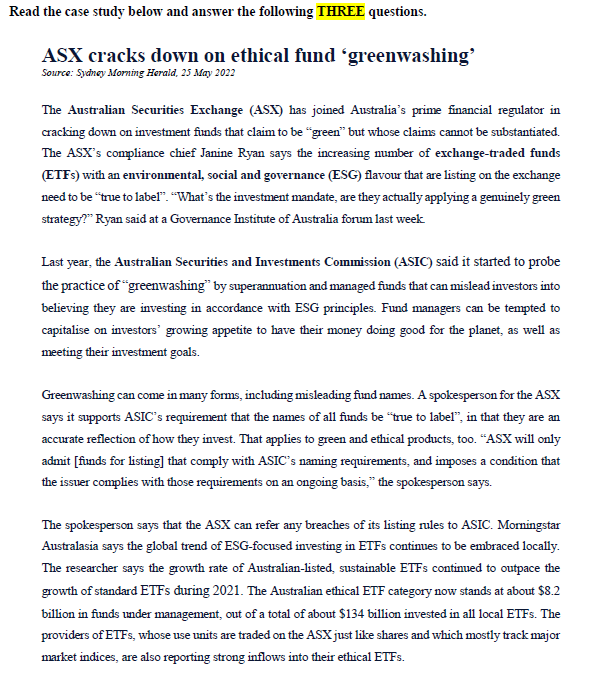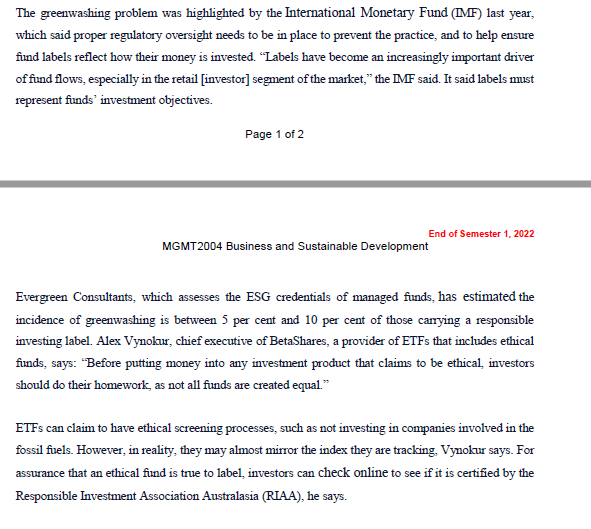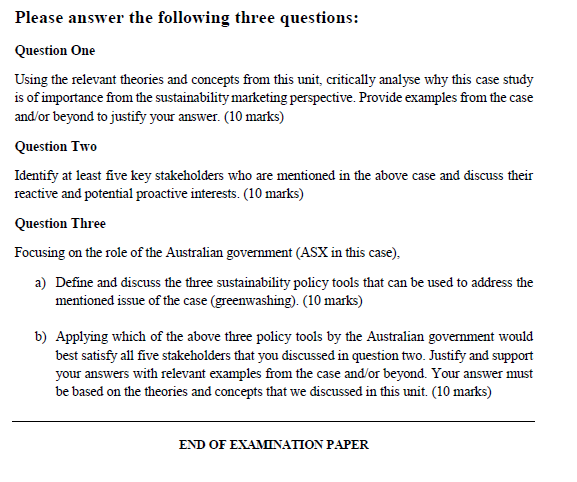Answered step by step
Verified Expert Solution
Question
1 Approved Answer
Read the case study below and answer the following THREE questions. ASX cracks down on ethical fund greenwashing' Source: Sydney Morning Herald, 25 May



Read the case study below and answer the following THREE questions. ASX cracks down on ethical fund greenwashing' Source: Sydney Morning Herald, 25 May 2022 The Australian Securities Exchange (ASX) has joined Australia's prime financial regulator in cracking down on investment funds that claim to be "green" but whose claims cannot be substantiated. The ASX's compliance chief Janine Ryan says the increasing number of exchange-traded funds (ETFs) with an environmental, social and governance (ESG) flavour that are listing on the exchange need to be "true to label". "What's the investment mandate, are they actually applying a genuinely green strategy?" Ryan said at a Governance Institute of Australia forum last week. Last year, the Australian Securities and Investments Commission (ASIC) said it started to probe the practice of "greenwashing" by superannuation and managed funds that can mislead investors into believing they are investing in accordance with ESG principles. Fund managers can be tempted to capitalise on investors' growing appetite to have their money doing good for the planet, as well as meeting their investment goals. Greenwashing can come in many forms, including misleading fund names. A spokesperson for the ASX says it supports ASIC's requirement that the names of all funds be "true to label", in that they are an accurate reflection of how they invest. That applies to green and ethical products, too. "ASX will only admit [funds for listing] that comply with ASIC's naming requirements, and imposes a condition that the issuer complies with those requirements on an ongoing basis," the spokesperson says. The spokesperson says that the ASX can refer any breaches of its listing rules to ASIC. Morningstar Australasia says the global trend of ESG-focused investing in ETFs continues to be embraced locally. The researcher says the growth rate of Australian-listed, sustainable ETFs continued to outpace the growth of standard ETFs during 2021. The Australian ethical ETF category now stands at about $8.2 billion in funds under management, out of a total of about $134 billion invested in all local ETFs. The providers of ETFs, whose use units are traded on the ASX just like shares and which mostly track major market indices, are also reporting strong inflows into their ethical ETFs. The greenwashing problem was highlighted by the International Monetary Fund (IMF) last year, which said proper regulatory oversight needs to be in place to prevent the practice, and to help ensure fund labels reflect how their money is invested. "Labels have become an increasingly important driver of fund flows, especially in the retail [investor] segment of the market," the IMF said. It said labels must represent funds' investment objectives. Page 1 of 2 MGMT2004 Business and Sustainable Development End of Semester 1, 2022 Evergreen Consultants, which assesses the ESG credentials of managed funds, has estimated the incidence of greenwashing is between 5 per cent and 10 per cent of those carrying a responsible investing label. Alex Vynokur, chief executive of BetaShares, a provider of ETFs that includes ethical funds, says: "Before putting money into any investment product that claims to be ethical, investors should do their homework, as not all funds are created equal." ETFs can claim to have ethical screening processes, such as not investing in companies involved in the fossil fuels. However, in reality, they may almost mirror the index they are tracking, Vynokur says. For assurance that an ethical fund is true to label, investors can check online to see if it is certified by the Responsible Investment Association Australasia (RIAA), he says. Please answer the following three questions: Question One Using the relevant theories and concepts from this unit, critically analyse why this case study is of importance from the sustainability marketing perspective. Provide examples from the case and/or beyond to justify your answer. (10 marks) Question Two Identify at least five key stakeholders who are mentioned in the above case and discuss their reactive and potential proactive interests. (10 marks) Question Three Focusing on the role of the Australian government (ASX in this case). a) Define and discuss the three sustainability policy tools that can be used to address the mentioned issue of the case (greenwashing). (10 marks) b) Applying which of the above three policy tools by the Australian government would best satisfy all five stakeholders that you discussed in question two. Justify and support your answers with relevant examples from the case and/or beyond. Your answer must be based on the theories and concepts that we discussed in this unit. (10 marks) END OF EXAMINATION PAPER
Step by Step Solution
There are 3 Steps involved in it
Step: 1

Get Instant Access to Expert-Tailored Solutions
See step-by-step solutions with expert insights and AI powered tools for academic success
Step: 2

Step: 3

Ace Your Homework with AI
Get the answers you need in no time with our AI-driven, step-by-step assistance
Get Started


